Unit 5 Wild animals 教材全解及单元测试卷
文档属性
| 名称 | Unit 5 Wild animals 教材全解及单元测试卷 |
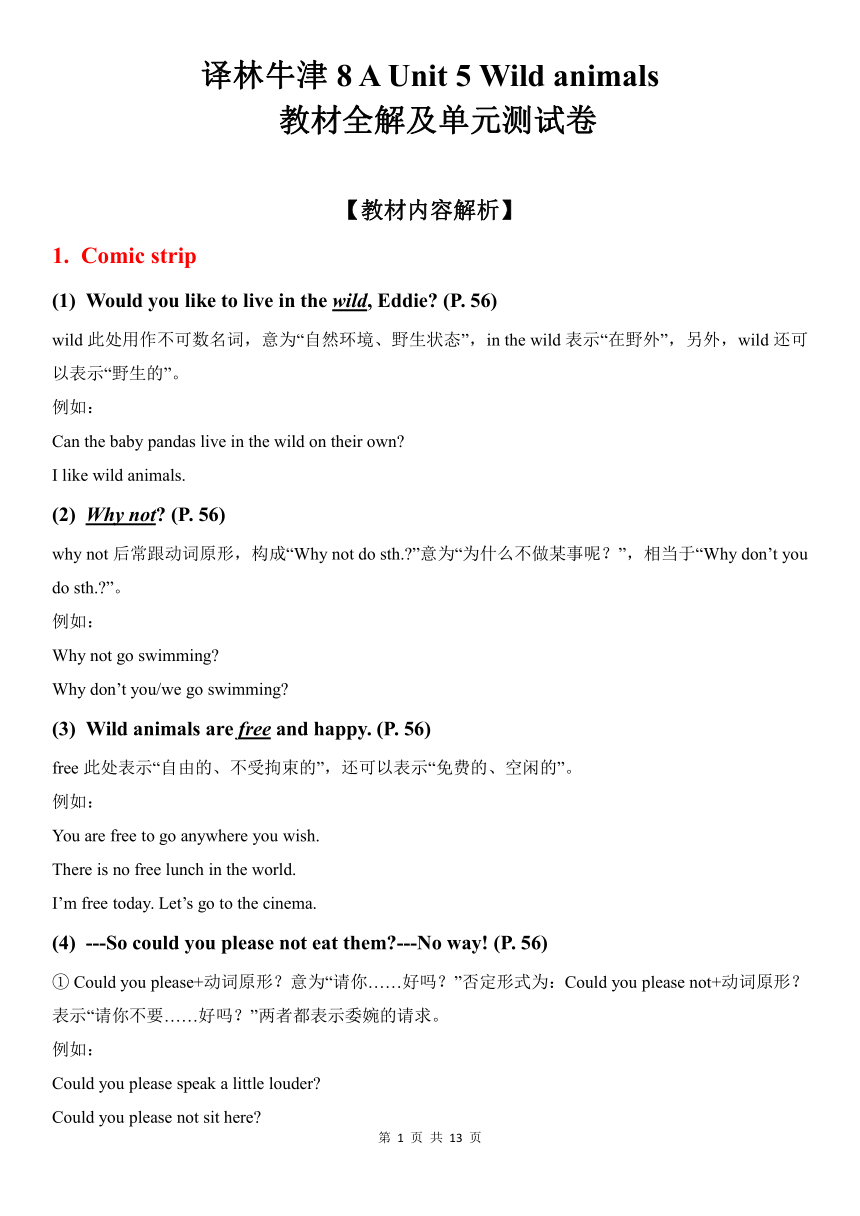
|
|
| 格式 | docx | ||
| 文件大小 | 39.6KB | ||
| 资源类型 | 试卷 | ||
| 版本资源 | 牛津译林版 | ||
| 科目 | 英语 | ||
| 更新时间 | 2022-04-09 22:09:52 | ||
图片预览

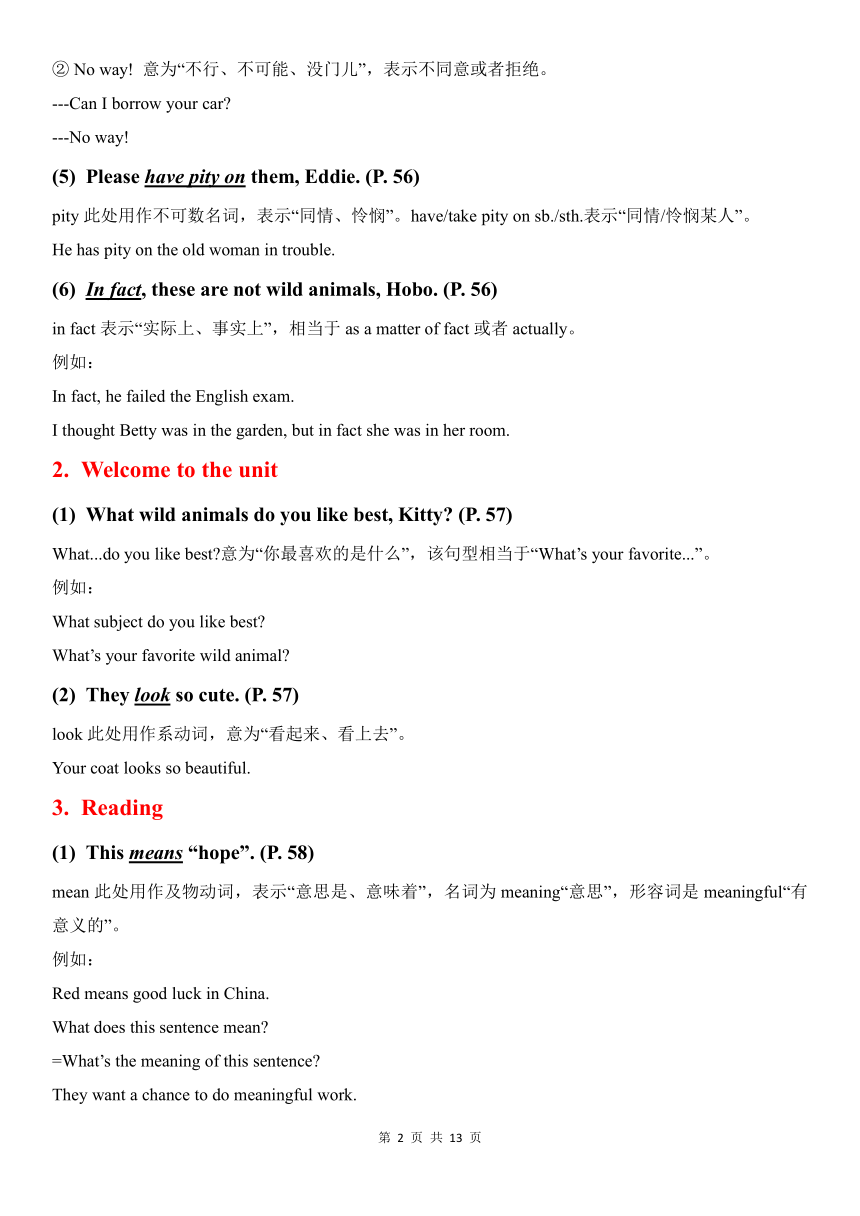
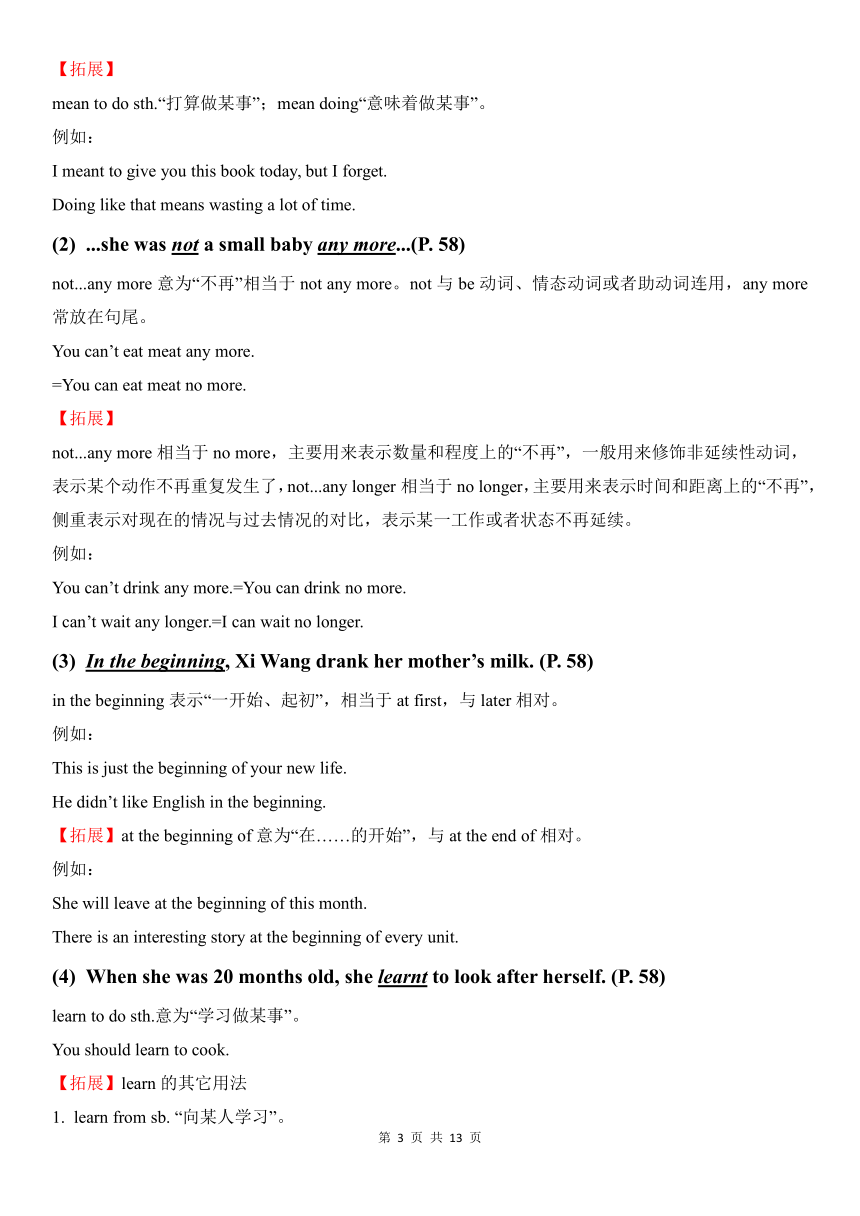
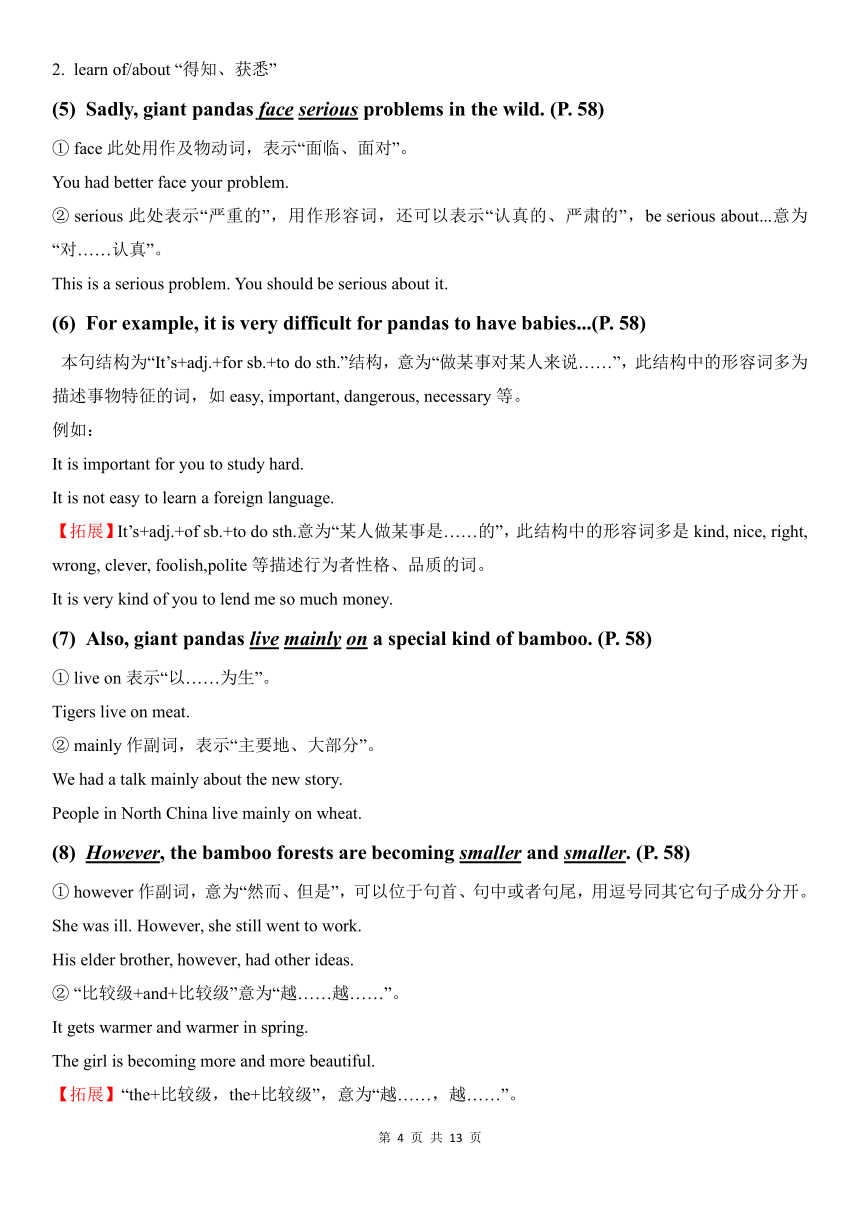
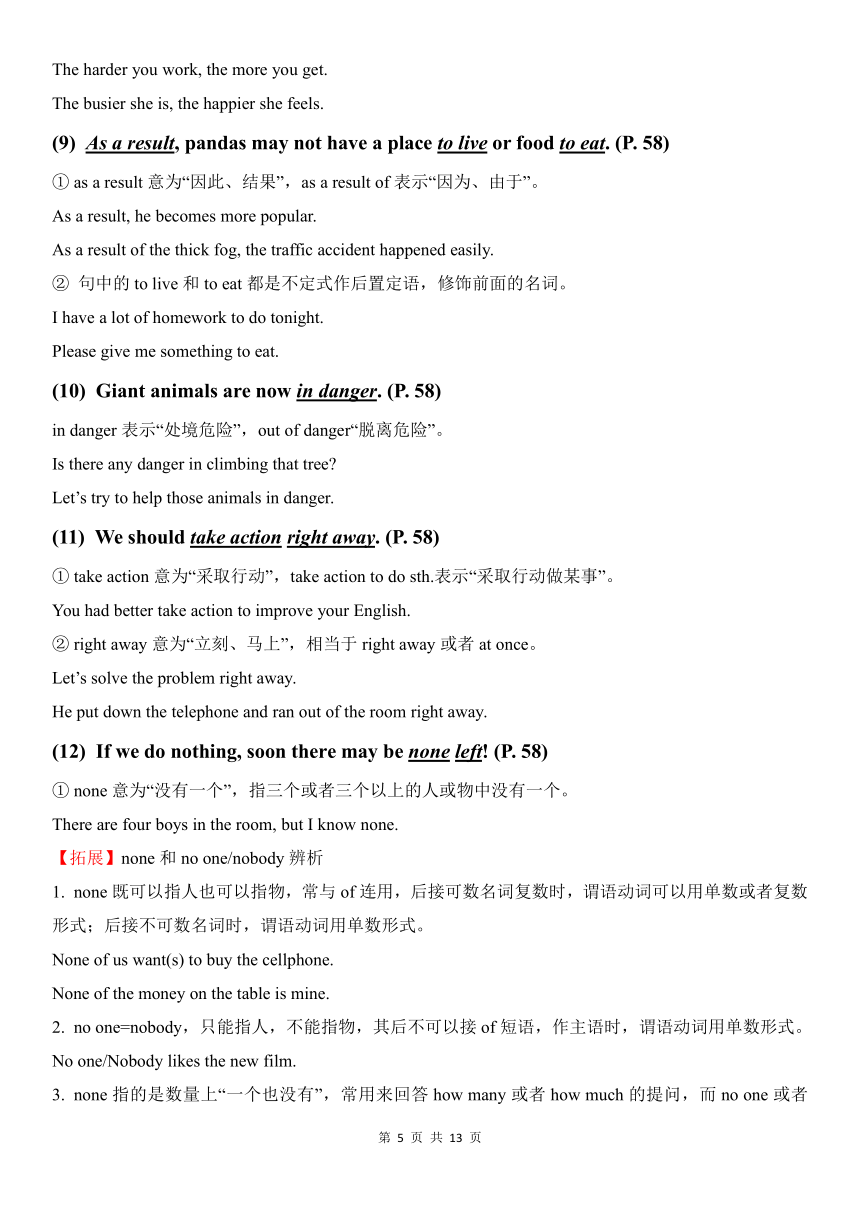
文档简介
译林牛津8 A Unit 5 Wild animals
教材全解及单元测试卷
【教材内容解析】
Comic strip
Would you like to live in the wild, Eddie (P. 56)
wild此处用作不可数名词,意为“自然环境、野生状态”,in the wild表示“在野外”,另外,wild还可以表示“野生的”。
例如:
Can the baby pandas live in the wild on their own
I like wild animals.
Why not (P. 56)
why not后常跟动词原形,构成“Why not do sth. ”意为“为什么不做某事呢?”,相当于“Why don’t you do sth. ”。
例如:
Why not go swimming
Why don’t you/we go swimming
Wild animals are free and happy. (P. 56)
free此处表示“自由的、不受拘束的”,还可以表示“免费的、空闲的”。
例如:
You are free to go anywhere you wish.
There is no free lunch in the world.
I’m free today. Let’s go to the cinema.
---So could you please not eat them ---No way! (P. 56)
① Could you please+动词原形?意为“请你……好吗?”否定形式为:Could you please not+动词原形?表示“请你不要……好吗?”两者都表示委婉的请求。
例如:
Could you please speak a little louder
Could you please not sit here
② No way! 意为“不行、不可能、没门儿”,表示不同意或者拒绝。
---Can I borrow your car
---No way!
Please have pity on them, Eddie. (P. 56)
pity此处用作不可数名词,表示“同情、怜悯”。have/take pity on sb./sth.表示“同情/怜悯某人”。
He has pity on the old woman in trouble.
In fact, these are not wild animals, Hobo. (P. 56)
in fact表示“实际上、事实上”,相当于as a matter of fact或者actually。
例如:
In fact, he failed the English exam.
I thought Betty was in the garden, but in fact she was in her room.
Welcome to the unit
What wild animals do you like best, Kitty (P. 57)
What...do you like best 意为“你最喜欢的是什么”,该句型相当于“What’s your favorite...”。
例如:
What subject do you like best
What’s your favorite wild animal
They look so cute. (P. 57)
look此处用作系动词,意为“看起来、看上去”。
Your coat looks so beautiful.
Reading
This means “hope”. (P. 58)
mean此处用作及物动词,表示“意思是、意味着”,名词为meaning“意思”,形容词是meaningful“有意义的”。
例如:
Red means good luck in China.
What does this sentence mean
=What’s the meaning of this sentence
They want a chance to do meaningful work.
【拓展】
mean to do sth.“打算做某事”;mean doing“意味着做某事”。
例如:
I meant to give you this book today, but I forget.
Doing like that means wasting a lot of time.
...she was not a small baby any more...(P. 58)
not...any more意为“不再”相当于not any more。not与be动词、情态动词或者助动词连用,any more常放在句尾。
You can’t eat meat any more.
=You can eat meat no more.
【拓展】
not...any more相当于no more,主要用来表示数量和程度上的“不再”,一般用来修饰非延续性动词,表示某个动作不再重复发生了,not...any longer相当于no longer,主要用来表示时间和距离上的“不再”,侧重表示对现在的情况与过去情况的对比,表示某一工作或者状态不再延续。
例如:
You can’t drink any more.=You can drink no more.
I can’t wait any longer.=I can wait no longer.
In the beginning, Xi Wang drank her mother’s milk. (P. 58)
in the beginning表示“一开始、起初”,相当于at first,与later相对。
例如:
This is just the beginning of your new life.
He didn’t like English in the beginning.
【拓展】at the beginning of意为“在……的开始”,与at the end of相对。
例如:
She will leave at the beginning of this month.
There is an interesting story at the beginning of every unit.
When she was 20 months old, she learnt to look after herself. (P. 58)
learn to do sth.意为“学习做某事”。
You should learn to cook.
【拓展】learn的其它用法
learn from sb. “向某人学习”。
learn of/about “得知、获悉”
Sadly, giant pandas face serious problems in the wild. (P. 58)
① face此处用作及物动词,表示“面临、面对”。
You had better face your problem.
② serious此处表示“严重的”,用作形容词,还可以表示“认真的、严肃的”,be serious about...意为“对……认真”。
This is a serious problem. You should be serious about it.
For example, it is very difficult for pandas to have babies...(P. 58)
本句结构为“It’s+adj.+for sb.+to do sth.”结构,意为“做某事对某人来说……”,此结构中的形容词多为描述事物特征的词,如easy, important, dangerous, necessary等。
例如:
It is important for you to study hard.
It is not easy to learn a foreign language.
【拓展】It’s+adj.+of sb.+to do sth.意为“某人做某事是……的”,此结构中的形容词多是kind, nice, right, wrong, clever, foolish,polite等描述行为者性格、品质的词。
It is very kind of you to lend me so much money.
Also, giant pandas live mainly on a special kind of bamboo. (P. 58)
① live on表示“以……为生”。
Tigers live on meat.
② mainly作副词,表示“主要地、大部分”。
We had a talk mainly about the new story.
People in North China live mainly on wheat.
However, the bamboo forests are becoming smaller and smaller. (P. 58)
① however作副词,意为“然而、但是”,可以位于句首、句中或者句尾,用逗号同其它句子成分分开。
She was ill. However, she still went to work.
His elder brother, however, had other ideas.
② “比较级+and+比较级”意为“越……越……”。
It gets warmer and warmer in spring.
The girl is becoming more and more beautiful.
【拓展】“the+比较级,the+比较级”,意为“越……,越……”。
The harder you work, the more you get.
The busier she is, the happier she feels.
As a result, pandas may not have a place to live or food to eat. (P. 58)
① as a result意为“因此、结果”,as a result of表示“因为、由于”。
As a result, he becomes more popular.
As a result of the thick fog, the traffic accident happened easily.
② 句中的to live和to eat都是不定式作后置定语,修饰前面的名词。
I have a lot of homework to do tonight.
Please give me something to eat.
Giant animals are now in danger. (P. 58)
in danger表示“处境危险”,out of danger“脱离危险”。
Is there any danger in climbing that tree
Let’s try to help those animals in danger.
We should take action right away. (P. 58)
① take action意为“采取行动”,take action to do sth.表示“采取行动做某事”。
You had better take action to improve your English.
② right away意为“立刻、马上”,相当于right away或者at once。
Let’s solve the problem right away.
He put down the telephone and ran out of the room right away.
If we do nothing, soon there may be none left! (P. 58)
① none意为“没有一个”,指三个或者三个以上的人或物中没有一个。
There are four boys in the room, but I know none.
【拓展】none和no one/nobody辨析
none既可以指人也可以指物,常与of连用,后接可数名词复数时,谓语动词可以用单数或者复数形式;后接不可数名词时,谓语动词用单数形式。
None of us want(s) to buy the cellphone.
None of the money on the table is mine.
no one=nobody,只能指人,不能指物,其后不可以接of短语,作主语时,谓语动词用单数形式。
No one/Nobody likes the new film.
none指的是数量上“一个也没有”,常用来回答how many或者how much的提问,而no one或者nobody只能回答who的提问。
---How many students have been there
---None.
---Who is in the office
---No one/Nobody.
② 句中的left是leave的过去分词,作后置定语,意为“剩下的、留下的”。
Is there any water left in the bottle
My father likes reading books written by Lu Xun.
Grammar
The horse is standing with its eyes closed. (P. 61)
with its eyes closed是“with+名词+形容词”结构,在句中作伴随状语。
My father likes sleeping with the windows open.
Bats can’t see, but they can decide to fly the right way with the help of their mouth and ears. (P. 62)
with the help of意为“在……的帮助下”,相当于with one’s help。
I passed the exam with the help of Mr Wang.
=With Mr Wang’s help, I passed the exam.
Did you know that bees never get lost (P. 62)
get lost意为“迷路”相当于lose one’s way。
Mrs Wang got lost in the big city.
If you get lost/are lost, you can look at the sun.
Bees always remember to come back the same way as they went. (P. 62)
the same...as...表示“和……一样”。
Her hair is the same color as her mother’s.
He is not the same man as he used to be.
Your opinion is the same as mine.
...but sometimes they forget where to find the food. (P. 62)
where to find the food为“疑问词+不定式”结构,在句中作主语、宾语或者表语,可以与从句相互转换。
When to leave is still a problem.
I don’t know how to use it.
The problem is who to help you.
Can you tell me how to get there
=Can you tell me how I can get there
Integrated skills
...but only for a short while...(P. 63)
while此处用作名词,意为“一会儿、一段时间”。
I like to have a rest for a while after lunch.
thick (P. 63)
thick作形容词,表示“厚的、密的、浓的”,可与介词with连用。
He is wearing thick glasses.
The table is thick with dust.
I’m sorry to hear that. (P. 63)
I’m sorry to hear that. 意为“听到那件事我很难过”,常用于当某人遇到不幸的事情时,为了表示遗憾或者难过而说出的话。
---Meimei is ill in hospital.
---I’m sorry to hear that.
What a shame! (P. 64)
What a shame!意为“多遗憾啊”,相当于What a pity!表示遗憾或者惋惜之意,It is a shame to do sth.意为“做某事是可惜的”。
It’s a shame to do that.
He felt a deep sense of shame.
Study skills
illness (P. 65)
illness是名词,表示“疾病”,是由“形容词ill+后缀ness”构成的名词。
His daughter’s illness changed his life.
Many wild animals are now in danger because of hunting. (P. 65)
because of意为“因为、由于”,后接名词、代词或者动名词,because是连词,引导原因状语从句,后接一个句子。
He is late for school because of the bad weather.
=He is late for school because the weather is bad.
We hope you can accept our invitation and join us. (P. 65)
① accept强调主观上愿意接受,receive意为“收到、接到”,常同from连用;另外,receive表示客观上收到或者拿到,但主观上不一定接受。
I was happy to receive a call from my old friend.
I received his gift yesterday, but I wouldn’t like to accept it.
② invitation作名词,表示“邀请”。
She accepted his invitation to join him for dinner.
I received an invitation to the party.
Task
A report on bears. (P. 66)
on此处表示“关于”,相当于about,但是on多用于学术性比较强的场合,about是一种普通的用法。
This is a book on history.
move slowly in the daytime (P. 66)
① move表示“移动、搬迁”。
Can you move the box to the next room
His family moved to a new house.
② in the daytime意为“在白天”。
You can move everywhere in the daytime.
sleep through the winter (P. 66)
through此处用作介词,意为“自始至终、整个期间”。
The cold weather continued through the spring.
He slept right through the day.
Otherwise, there may be no bears left in the world. (P. 67)
otherwise作副词,表示“要不然、否则”,强调如果不做某事,就会发生不好的事情。
Do your work every day. Otherwise, it will pile up.
Do as you are told; otherwise you will be in trouble.
【重点短语和句型归纳】
重点短语
1. have a pity on 同情,怜悯
2. in the beginning 一开始
3. not...any more 不再
4. for example 例如
5. as a result 因此
6. in danger 处境危险
7. for a while 一会儿
8. get lost 迷路
9. the same as 和……一样
10. with the help of 在……帮助下
11. because of 因为
12. be good at 擅长
13. no way不可能
14. in fact 实际上
15. live on 以食......为主
16. lose one's life失去生命
17. take action 采取
18. at first 首先
19. in the daytime 在白天
重点句型
Why not+do 为什么不......呢
Could you please(+not)+do sth. 请你(不要)......好吗?
What... do you like best 你最喜欢的......是什么?
It +be+形容词(+for sb.)+to do sth. (某人)做某事是......的
be sorry to do sth. 学习/学会做某事
“比较级+and+比较级” 越来越......
7. learn to do sth. 学会做某事
【语法讲解】
1. may的用法
may可以用来表示请求或给予许可,相当于can,但may比can更正式和礼貌.常用于请求陌生人及受尊敬的人的许可。
一May l smoke here
一Yes, you may.
一No, You may not./ No,you mustn’t.
【知识拓展】
may也可以用来表示猜测,意为“可能”。
The man over there may be his father.
(2) might表示更正式、更礼貌的请求,语气非常委婉。值得注意的是,当might表示征询对方 意见时,它不是may的过去式,由商量引起的问句进行回答时,通常用may。
--Might I go out to play games
--Yes, you may. --No, you may not. / I'm afraid not.
2. 动词不定式作宾语
① 常见的能带动词不定式作宾语的动词有:want,like,love,wish,hope,need,try,ask,seem,help,learn,decide,plan,start,begin,forget,remember,choose ,prepare,agree等。
Kate wants to be a doctor when she grows up.
He decided to buy a new MP4.
We all hope to go to Taizhou next month.
I don’t like to be late for school.
I forgot to bring the MP4 hem.
② 有些动词后面接复合宾语时,常用it作形式宾语,而真正的宾语则由动词不定式来担当,并位于宾语补足语之后。常见的这样的动词有find,think,feel,make等。
I find it interesting to play computer games我发现玩电脑游戏很有趣。
We all think it very difficult to finish the work in an hour.
③ “疑问词+不定式”结构
疑问词who,what,which,when,where和how后接动词不定式可在句中作宾语、主语、表语。
I don’t know What to do next.
Can you tell me how to get to the hospital
【知识拓展】
(1)动词不定式作主语。
To help others is our duty.帮助他人是我们的责任。
【注意】不定式作主语时,在多数情况下,常用it作形式主语,而把不定式放在后面
To 1earrl English well is very important for us
=It is very important for us to leam English well.
It is very difficult for me to work out the Maths problem.
(2)动词不定式作表语。
My wish is to be a basketball player.
My sister’s dream is to be a nurse.
(3)动词不定式作定语。
I have two new books to read.
Do you have anything to say for yourself
【单元测试】
短语翻译(每题1分,共10分)
开始做某事 2、学会做某事
在四个月大的时候 4、照顾
不可能 6、在野外
处于危险中 8、同情某人
9、在.....的帮助下 10、擅长
二、任务型阅读(每题1分,共10分)
阅读下列短文,根据短文中的信息完成文后的表格(每空一词)
In the past, man did not have to think about the protection of his environment. There were not many people on earth, and natural resources seemed to be unlimited.
Today, things are different. The world has become too crowded. We are using up our natural resources too quickly, and at the same time we are polluting our environment with dangerous chemicals. If we continue like this, human life on earth will not survive.
Everyone realizes today that if too many fish are taken from the sea, there will soon be none left. Yet, with modern fishing methods, more and more fish are caught. We know that if too many trees are cut down, forests will disappear and nothing will grow on the land. Yet, we continue to use bigger and more powerful machines to cut down more and more trees.
We realize that if rivers are polluted with waste products from factories, we will die. However, in most countries waste products are still put into rivers or into the sea, and there are few laws to stop this.
We know, too, that if the population of the world continues to rise at the present rate, in a few years, there will not be enough food.
What can we do to solve these problems
If we eat more vegetables and less meat, we will easily get more food. Land that is used to grow crops can feed five times more people than land where animals are kept.
The world population will not rise so quickly if people use modern methods of birth control.
Finally, if we educate people to think about the problems, we shall have a better and cleaner living place in the future.
The importance of 1 the environment
Problems ◆ More fish being caught. ◆ More 2 being cut down. ◆ More waste products being 3 into rivers. ◆ More 4 being born.
Causes ◆ The world is becoming too 5 . ◆ Modern methods make the situation 6 .
7 We human beings will not survive on the earth.
Solutions ◆ Eat more vegetables and less meat so that more food will be 8 for everyone. ◆ Use modern methods of 9 control so that the population will not grow too fast. ◆ Educate people so that the 10 will be better and cleaner.
1. 2. 3. 4. 5.
6. 7. 8. 9. 10.
六、用所给词的适当形式填空(每题1分,共15分)
1. Eating too much sweet is bad for your _________(tooth).
2. He is a _________(honest)boy so we seldom believe what he says.
3.We Chinese will celebrate the _____(ninety)birthday of the Chinese Communist Party(中国共产党)in many ways.
4. In the modern world, people often contact each other by _______ (send) e-mails.
5. To keep healthy, I decide ______(exercise) half an hour every day.
6. When traveling, you'd better take a map with ________ (you).
7. The students in Class 2 are having a _________(discuss) about how to achieve a balance between study and play.
8. Though she answered the teacher's questions _________(incorrect),the teacher didn't blame her.
9. More and more people have their own cars. That's why there's ________(heavy)traffic than before.
10.—Why are you so happy today
—Because I _____(win)the badminton match.
11. David fell ______ (sleep) in class because he stayed up too late last night.
12. Take exercise one hour a day, you'll become ______ (healthy) than before.
13. We organized a lot of activities to celebrate our school's ______ (fifty) birthday 14. Wearing red can help you make a ______(decision) quickly.
15. We're talking about where ______(spend) our coming summer holiday.
教材全解及单元测试卷
【教材内容解析】
Comic strip
Would you like to live in the wild, Eddie (P. 56)
wild此处用作不可数名词,意为“自然环境、野生状态”,in the wild表示“在野外”,另外,wild还可以表示“野生的”。
例如:
Can the baby pandas live in the wild on their own
I like wild animals.
Why not (P. 56)
why not后常跟动词原形,构成“Why not do sth. ”意为“为什么不做某事呢?”,相当于“Why don’t you do sth. ”。
例如:
Why not go swimming
Why don’t you/we go swimming
Wild animals are free and happy. (P. 56)
free此处表示“自由的、不受拘束的”,还可以表示“免费的、空闲的”。
例如:
You are free to go anywhere you wish.
There is no free lunch in the world.
I’m free today. Let’s go to the cinema.
---So could you please not eat them ---No way! (P. 56)
① Could you please+动词原形?意为“请你……好吗?”否定形式为:Could you please not+动词原形?表示“请你不要……好吗?”两者都表示委婉的请求。
例如:
Could you please speak a little louder
Could you please not sit here
② No way! 意为“不行、不可能、没门儿”,表示不同意或者拒绝。
---Can I borrow your car
---No way!
Please have pity on them, Eddie. (P. 56)
pity此处用作不可数名词,表示“同情、怜悯”。have/take pity on sb./sth.表示“同情/怜悯某人”。
He has pity on the old woman in trouble.
In fact, these are not wild animals, Hobo. (P. 56)
in fact表示“实际上、事实上”,相当于as a matter of fact或者actually。
例如:
In fact, he failed the English exam.
I thought Betty was in the garden, but in fact she was in her room.
Welcome to the unit
What wild animals do you like best, Kitty (P. 57)
What...do you like best 意为“你最喜欢的是什么”,该句型相当于“What’s your favorite...”。
例如:
What subject do you like best
What’s your favorite wild animal
They look so cute. (P. 57)
look此处用作系动词,意为“看起来、看上去”。
Your coat looks so beautiful.
Reading
This means “hope”. (P. 58)
mean此处用作及物动词,表示“意思是、意味着”,名词为meaning“意思”,形容词是meaningful“有意义的”。
例如:
Red means good luck in China.
What does this sentence mean
=What’s the meaning of this sentence
They want a chance to do meaningful work.
【拓展】
mean to do sth.“打算做某事”;mean doing“意味着做某事”。
例如:
I meant to give you this book today, but I forget.
Doing like that means wasting a lot of time.
...she was not a small baby any more...(P. 58)
not...any more意为“不再”相当于not any more。not与be动词、情态动词或者助动词连用,any more常放在句尾。
You can’t eat meat any more.
=You can eat meat no more.
【拓展】
not...any more相当于no more,主要用来表示数量和程度上的“不再”,一般用来修饰非延续性动词,表示某个动作不再重复发生了,not...any longer相当于no longer,主要用来表示时间和距离上的“不再”,侧重表示对现在的情况与过去情况的对比,表示某一工作或者状态不再延续。
例如:
You can’t drink any more.=You can drink no more.
I can’t wait any longer.=I can wait no longer.
In the beginning, Xi Wang drank her mother’s milk. (P. 58)
in the beginning表示“一开始、起初”,相当于at first,与later相对。
例如:
This is just the beginning of your new life.
He didn’t like English in the beginning.
【拓展】at the beginning of意为“在……的开始”,与at the end of相对。
例如:
She will leave at the beginning of this month.
There is an interesting story at the beginning of every unit.
When she was 20 months old, she learnt to look after herself. (P. 58)
learn to do sth.意为“学习做某事”。
You should learn to cook.
【拓展】learn的其它用法
learn from sb. “向某人学习”。
learn of/about “得知、获悉”
Sadly, giant pandas face serious problems in the wild. (P. 58)
① face此处用作及物动词,表示“面临、面对”。
You had better face your problem.
② serious此处表示“严重的”,用作形容词,还可以表示“认真的、严肃的”,be serious about...意为“对……认真”。
This is a serious problem. You should be serious about it.
For example, it is very difficult for pandas to have babies...(P. 58)
本句结构为“It’s+adj.+for sb.+to do sth.”结构,意为“做某事对某人来说……”,此结构中的形容词多为描述事物特征的词,如easy, important, dangerous, necessary等。
例如:
It is important for you to study hard.
It is not easy to learn a foreign language.
【拓展】It’s+adj.+of sb.+to do sth.意为“某人做某事是……的”,此结构中的形容词多是kind, nice, right, wrong, clever, foolish,polite等描述行为者性格、品质的词。
It is very kind of you to lend me so much money.
Also, giant pandas live mainly on a special kind of bamboo. (P. 58)
① live on表示“以……为生”。
Tigers live on meat.
② mainly作副词,表示“主要地、大部分”。
We had a talk mainly about the new story.
People in North China live mainly on wheat.
However, the bamboo forests are becoming smaller and smaller. (P. 58)
① however作副词,意为“然而、但是”,可以位于句首、句中或者句尾,用逗号同其它句子成分分开。
She was ill. However, she still went to work.
His elder brother, however, had other ideas.
② “比较级+and+比较级”意为“越……越……”。
It gets warmer and warmer in spring.
The girl is becoming more and more beautiful.
【拓展】“the+比较级,the+比较级”,意为“越……,越……”。
The harder you work, the more you get.
The busier she is, the happier she feels.
As a result, pandas may not have a place to live or food to eat. (P. 58)
① as a result意为“因此、结果”,as a result of表示“因为、由于”。
As a result, he becomes more popular.
As a result of the thick fog, the traffic accident happened easily.
② 句中的to live和to eat都是不定式作后置定语,修饰前面的名词。
I have a lot of homework to do tonight.
Please give me something to eat.
Giant animals are now in danger. (P. 58)
in danger表示“处境危险”,out of danger“脱离危险”。
Is there any danger in climbing that tree
Let’s try to help those animals in danger.
We should take action right away. (P. 58)
① take action意为“采取行动”,take action to do sth.表示“采取行动做某事”。
You had better take action to improve your English.
② right away意为“立刻、马上”,相当于right away或者at once。
Let’s solve the problem right away.
He put down the telephone and ran out of the room right away.
If we do nothing, soon there may be none left! (P. 58)
① none意为“没有一个”,指三个或者三个以上的人或物中没有一个。
There are four boys in the room, but I know none.
【拓展】none和no one/nobody辨析
none既可以指人也可以指物,常与of连用,后接可数名词复数时,谓语动词可以用单数或者复数形式;后接不可数名词时,谓语动词用单数形式。
None of us want(s) to buy the cellphone.
None of the money on the table is mine.
no one=nobody,只能指人,不能指物,其后不可以接of短语,作主语时,谓语动词用单数形式。
No one/Nobody likes the new film.
none指的是数量上“一个也没有”,常用来回答how many或者how much的提问,而no one或者nobody只能回答who的提问。
---How many students have been there
---None.
---Who is in the office
---No one/Nobody.
② 句中的left是leave的过去分词,作后置定语,意为“剩下的、留下的”。
Is there any water left in the bottle
My father likes reading books written by Lu Xun.
Grammar
The horse is standing with its eyes closed. (P. 61)
with its eyes closed是“with+名词+形容词”结构,在句中作伴随状语。
My father likes sleeping with the windows open.
Bats can’t see, but they can decide to fly the right way with the help of their mouth and ears. (P. 62)
with the help of意为“在……的帮助下”,相当于with one’s help。
I passed the exam with the help of Mr Wang.
=With Mr Wang’s help, I passed the exam.
Did you know that bees never get lost (P. 62)
get lost意为“迷路”相当于lose one’s way。
Mrs Wang got lost in the big city.
If you get lost/are lost, you can look at the sun.
Bees always remember to come back the same way as they went. (P. 62)
the same...as...表示“和……一样”。
Her hair is the same color as her mother’s.
He is not the same man as he used to be.
Your opinion is the same as mine.
...but sometimes they forget where to find the food. (P. 62)
where to find the food为“疑问词+不定式”结构,在句中作主语、宾语或者表语,可以与从句相互转换。
When to leave is still a problem.
I don’t know how to use it.
The problem is who to help you.
Can you tell me how to get there
=Can you tell me how I can get there
Integrated skills
...but only for a short while...(P. 63)
while此处用作名词,意为“一会儿、一段时间”。
I like to have a rest for a while after lunch.
thick (P. 63)
thick作形容词,表示“厚的、密的、浓的”,可与介词with连用。
He is wearing thick glasses.
The table is thick with dust.
I’m sorry to hear that. (P. 63)
I’m sorry to hear that. 意为“听到那件事我很难过”,常用于当某人遇到不幸的事情时,为了表示遗憾或者难过而说出的话。
---Meimei is ill in hospital.
---I’m sorry to hear that.
What a shame! (P. 64)
What a shame!意为“多遗憾啊”,相当于What a pity!表示遗憾或者惋惜之意,It is a shame to do sth.意为“做某事是可惜的”。
It’s a shame to do that.
He felt a deep sense of shame.
Study skills
illness (P. 65)
illness是名词,表示“疾病”,是由“形容词ill+后缀ness”构成的名词。
His daughter’s illness changed his life.
Many wild animals are now in danger because of hunting. (P. 65)
because of意为“因为、由于”,后接名词、代词或者动名词,because是连词,引导原因状语从句,后接一个句子。
He is late for school because of the bad weather.
=He is late for school because the weather is bad.
We hope you can accept our invitation and join us. (P. 65)
① accept强调主观上愿意接受,receive意为“收到、接到”,常同from连用;另外,receive表示客观上收到或者拿到,但主观上不一定接受。
I was happy to receive a call from my old friend.
I received his gift yesterday, but I wouldn’t like to accept it.
② invitation作名词,表示“邀请”。
She accepted his invitation to join him for dinner.
I received an invitation to the party.
Task
A report on bears. (P. 66)
on此处表示“关于”,相当于about,但是on多用于学术性比较强的场合,about是一种普通的用法。
This is a book on history.
move slowly in the daytime (P. 66)
① move表示“移动、搬迁”。
Can you move the box to the next room
His family moved to a new house.
② in the daytime意为“在白天”。
You can move everywhere in the daytime.
sleep through the winter (P. 66)
through此处用作介词,意为“自始至终、整个期间”。
The cold weather continued through the spring.
He slept right through the day.
Otherwise, there may be no bears left in the world. (P. 67)
otherwise作副词,表示“要不然、否则”,强调如果不做某事,就会发生不好的事情。
Do your work every day. Otherwise, it will pile up.
Do as you are told; otherwise you will be in trouble.
【重点短语和句型归纳】
重点短语
1. have a pity on 同情,怜悯
2. in the beginning 一开始
3. not...any more 不再
4. for example 例如
5. as a result 因此
6. in danger 处境危险
7. for a while 一会儿
8. get lost 迷路
9. the same as 和……一样
10. with the help of 在……帮助下
11. because of 因为
12. be good at 擅长
13. no way不可能
14. in fact 实际上
15. live on 以食......为主
16. lose one's life失去生命
17. take action 采取
18. at first 首先
19. in the daytime 在白天
重点句型
Why not+do 为什么不......呢
Could you please(+not)+do sth. 请你(不要)......好吗?
What... do you like best 你最喜欢的......是什么?
It +be+形容词(+for sb.)+to do sth. (某人)做某事是......的
be sorry to do sth. 学习/学会做某事
“比较级+and+比较级” 越来越......
7. learn to do sth. 学会做某事
【语法讲解】
1. may的用法
may可以用来表示请求或给予许可,相当于can,但may比can更正式和礼貌.常用于请求陌生人及受尊敬的人的许可。
一May l smoke here
一Yes, you may.
一No, You may not./ No,you mustn’t.
【知识拓展】
may也可以用来表示猜测,意为“可能”。
The man over there may be his father.
(2) might表示更正式、更礼貌的请求,语气非常委婉。值得注意的是,当might表示征询对方 意见时,它不是may的过去式,由商量引起的问句进行回答时,通常用may。
--Might I go out to play games
--Yes, you may. --No, you may not. / I'm afraid not.
2. 动词不定式作宾语
① 常见的能带动词不定式作宾语的动词有:want,like,love,wish,hope,need,try,ask,seem,help,learn,decide,plan,start,begin,forget,remember,choose ,prepare,agree等。
Kate wants to be a doctor when she grows up.
He decided to buy a new MP4.
We all hope to go to Taizhou next month.
I don’t like to be late for school.
I forgot to bring the MP4 hem.
② 有些动词后面接复合宾语时,常用it作形式宾语,而真正的宾语则由动词不定式来担当,并位于宾语补足语之后。常见的这样的动词有find,think,feel,make等。
I find it interesting to play computer games我发现玩电脑游戏很有趣。
We all think it very difficult to finish the work in an hour.
③ “疑问词+不定式”结构
疑问词who,what,which,when,where和how后接动词不定式可在句中作宾语、主语、表语。
I don’t know What to do next.
Can you tell me how to get to the hospital
【知识拓展】
(1)动词不定式作主语。
To help others is our duty.帮助他人是我们的责任。
【注意】不定式作主语时,在多数情况下,常用it作形式主语,而把不定式放在后面
To 1earrl English well is very important for us
=It is very important for us to leam English well.
It is very difficult for me to work out the Maths problem.
(2)动词不定式作表语。
My wish is to be a basketball player.
My sister’s dream is to be a nurse.
(3)动词不定式作定语。
I have two new books to read.
Do you have anything to say for yourself
【单元测试】
短语翻译(每题1分,共10分)
开始做某事 2、学会做某事
在四个月大的时候 4、照顾
不可能 6、在野外
处于危险中 8、同情某人
9、在.....的帮助下 10、擅长
二、任务型阅读(每题1分,共10分)
阅读下列短文,根据短文中的信息完成文后的表格(每空一词)
In the past, man did not have to think about the protection of his environment. There were not many people on earth, and natural resources seemed to be unlimited.
Today, things are different. The world has become too crowded. We are using up our natural resources too quickly, and at the same time we are polluting our environment with dangerous chemicals. If we continue like this, human life on earth will not survive.
Everyone realizes today that if too many fish are taken from the sea, there will soon be none left. Yet, with modern fishing methods, more and more fish are caught. We know that if too many trees are cut down, forests will disappear and nothing will grow on the land. Yet, we continue to use bigger and more powerful machines to cut down more and more trees.
We realize that if rivers are polluted with waste products from factories, we will die. However, in most countries waste products are still put into rivers or into the sea, and there are few laws to stop this.
We know, too, that if the population of the world continues to rise at the present rate, in a few years, there will not be enough food.
What can we do to solve these problems
If we eat more vegetables and less meat, we will easily get more food. Land that is used to grow crops can feed five times more people than land where animals are kept.
The world population will not rise so quickly if people use modern methods of birth control.
Finally, if we educate people to think about the problems, we shall have a better and cleaner living place in the future.
The importance of 1 the environment
Problems ◆ More fish being caught. ◆ More 2 being cut down. ◆ More waste products being 3 into rivers. ◆ More 4 being born.
Causes ◆ The world is becoming too 5 . ◆ Modern methods make the situation 6 .
7 We human beings will not survive on the earth.
Solutions ◆ Eat more vegetables and less meat so that more food will be 8 for everyone. ◆ Use modern methods of 9 control so that the population will not grow too fast. ◆ Educate people so that the 10 will be better and cleaner.
1. 2. 3. 4. 5.
6. 7. 8. 9. 10.
六、用所给词的适当形式填空(每题1分,共15分)
1. Eating too much sweet is bad for your _________(tooth).
2. He is a _________(honest)boy so we seldom believe what he says.
3.We Chinese will celebrate the _____(ninety)birthday of the Chinese Communist Party(中国共产党)in many ways.
4. In the modern world, people often contact each other by _______ (send) e-mails.
5. To keep healthy, I decide ______(exercise) half an hour every day.
6. When traveling, you'd better take a map with ________ (you).
7. The students in Class 2 are having a _________(discuss) about how to achieve a balance between study and play.
8. Though she answered the teacher's questions _________(incorrect),the teacher didn't blame her.
9. More and more people have their own cars. That's why there's ________(heavy)traffic than before.
10.—Why are you so happy today
—Because I _____(win)the badminton match.
11. David fell ______ (sleep) in class because he stayed up too late last night.
12. Take exercise one hour a day, you'll become ______ (healthy) than before.
13. We organized a lot of activities to celebrate our school's ______ (fifty) birthday 14. Wearing red can help you make a ______(decision) quickly.
15. We're talking about where ______(spend) our coming summer holiday.
